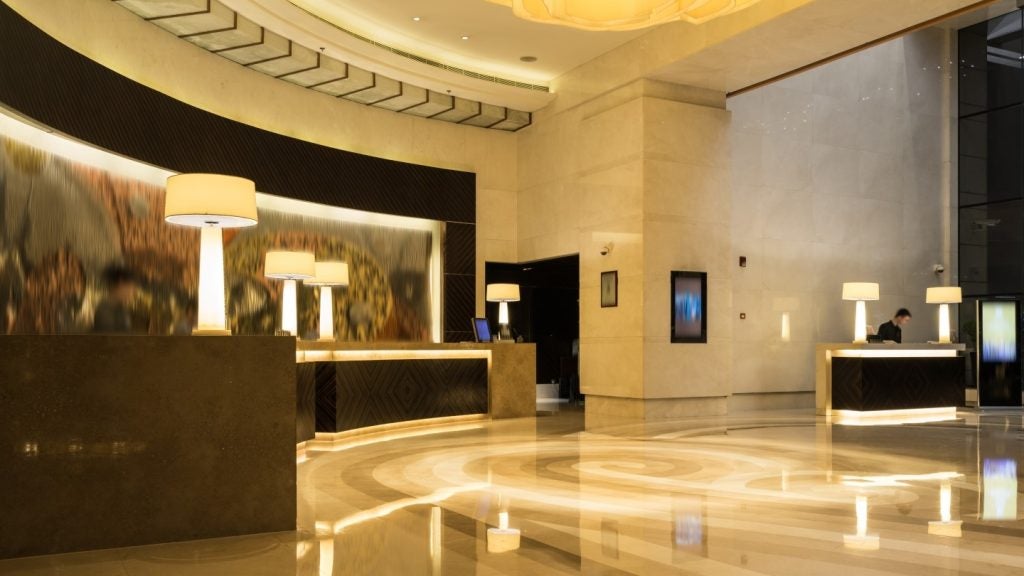
There are certain things a guest wants and expects from a deluxe hotel experience. There is the prompt and discreet service, sumptuous design and, of course, excellent food. What is just as crucial, though, is an alert, friendly face waiting to assist with any challenges the guest may face, whether it is getting hold of elusive opera tickets, arranging last-minute helicopter bookings or filling your room with 300 long-stemmed red roses. For a hotel to be truly deluxe, the services of a concierge are required.
Somewhat surprisingly, in the 21st century, with the internet and countless gadgets aimed at cutting out the middleman, the demand for a concierge service in the world’s most fashionable hotels is showing no signs of abating. Though the internet is a handy resource, it does not in any way match the service a concierge can offer, according to Roger Bastoni, president of international concierge association Clefs d’Or. The concierge network spans 36 countries and requires that its members have at least five years of hotel work experience and two years of concierge experience.
“Many aspects of life have been replaced by machinery, but machinery can’t smile, doesn’t have a personality and can’t provide human contact,” Bastoni says. “When you’re in a hotel with a toothache, you can complain to the computer all you want. But to be able to have a concierge make an appointment for 20 minutes’ time is a priceless service.”
DYING BREED?
More people than ever before are travelling to five-star hotels and the need for concierges is far from obsolete. However, there are not enough professional concierges to meet the industry’s needs, according to Bastoni. The situation is so bad that the Clefs d’Or is in the process of opening its own school for concierges in France.
See Also:
“Of course, you can go to your computer, but if you want something that requires local knowledge – the best beach, restaurant, off-beat destination – what you need is the advice of a concierge,” he says. “The most important thing is the satisfaction of the customer. It doesn’t just have to be hundreds of roses in the hotel room; it could also be finding the guest the right medicine at 3am.”
How well do you really know your competitors?
Access the most comprehensive Company Profiles on the market, powered by GlobalData. Save hours of research. Gain competitive edge.

Thank you!
Your download email will arrive shortly
Not ready to buy yet? Download a free sample
We are confident about the unique quality of our Company Profiles. However, we want you to make the most beneficial decision for your business, so we offer a free sample that you can download by submitting the below form
By GlobalDataSeven-star Dubai hoteliers have come to concierge conferences in Europe, where the art originated, to “listen and learn”. “It’s not necessarily in a seven-star hotel that you’ve got the best concierge service,” explains Bastoni. “After all, it’s not always in the best clinic that you find the best doctors.”
So what qualifies as a top-notch concierge? Bastoni, who has been in the business for over four decades, says that it often takes years to build up the knowledge and contacts required – but the most vital ingredient is the joy of helping and interacting with people.
“The best concierge must anticipate the needs of the guest even before the guest has started talking, and then come up with a solution,” he says. “It goes from A to Z – at one extreme, we can take care of providing a stamp, a sewing kit and a toothbrush, but at the other extreme, we might have to provide a jet within a few hours. There is no limit to the demands of the guest. I’ve been doing this for many years and I still don’t know what the next question will be – but my answer has always got to be positive.”
Frank Heller, general manager of the Charles Hotel in Munich, part of The Rocco Forte Collection, agrees that a concierge’s most valuable asset is an innate ability to interact with people.
“This is not just a job,” he says, “it’s almost like a hobby. You have to feel it and really like to do it. In fact, passion for the job is more important than heaps of experience. You have to hire for attitude and train for skill.” He also shares the view that online booking services and reviews sites will never replace a concierge, whose face is what is remembered in hotel lobbies.
“Of course, these online services are very nice tools to have, but the best tools of all are the connections concierges have in a city – you cannot pay for this,” he explains. “It takes time. Once you have the connections, you can do so many things you wouldn’t be able to do otherwise.”
ABOVE AND BEYOND
A decade ago, some hotels tried to cut corners by combining front desk service with concierge service, but it was to the detriment of their businesses. “They found out it’s not only about providing a room and a restaurant; it’s about service and quality,” says Heller. “Guest surveys show they want someone to take care of things. It’s not just flight reconfirmations. It’s about making every part of a guest’s stay run smoothly so they feel at home, feel happy and eventually come back.”
Heidi Velz, the Charles’ newly appointed head concierge, studied tourist management at university for two years before entering the hotel industry 17 years ago. She is a member of the Clefs d’Or. Apart from knowing a vast array of languages (her fluency in six apparently being “just enough”), Velz says a concierge has to be organised and possess the ability to think quickly. If a concierge cannot find a Lamborghini, Porsche and Ferrari, all in red, and have it insured to be driven out of the country in less than three hours, as Velz was recently asked to arrange, then a viable alternative must be presented to the guest.
“Whether it’s a celebrity, royalty or just a normal guest, they all have their needs and I try to meet them,” says Velz. “If somebody told me they would really love a ride on a cow, I wouldn’t laugh; I would call a farm and arrange it. If the guest wants it, we will get it for them.”
But it’s not always as simple as a ride on a cow. “Some people don’t have patience,” adds Velz. “They get angry even when what they are asking for is unrealistic. But a good concierge should present a solution even if the original request is not possible.” Gerard Poirier, one of the head concierges at Le Meurice in Paris has been in the industry for 32 years and says the needs of most guests are mundane and unglamorous.
“The guests who want to see museums go to a show, an opera, or a nice restaurant, this is still the main part of the job,” he comments. “Then you have the regular guest and the business people who might have a logistical or last minute request.”
When a new or unusual request does come in, however, the challenge is welcomed as it improves a concierge’s skills. “I like all the different kinds of people, from the simple tourist to the very important government man,” says Poirier. “Being in a hotel like Le Meurice is like travelling without moving because you meet people from all different countries, with all different types of needs. It’s very interesting.” When a guest returns over several years, they trust a concierge with everything and may even call when Poirier is off duty. “But the best part is when the guest leaves the hotel and says, ‘We had a good time and we will be back’,” he says. “Then you know you have done your job well.”
EXTRA SPECIAL
But this is no time to rest on laurels. Some hotels are taking the traditional concierge formula and amplifying it. The Town House Galleria is a seven-star establishment in Milan where each guest is assigned a personal butler or concierge who will, according to the hotel’s literature, “tenderly cherish the guest’s small dogs” or “book a Bentley for a jaunt to some heavenly spot.” In fact, the Town House Galleria is not daunted by the digital age; it uses it to improve services. When a guest books a room, a personal reservation profile is sent out, in which the guest can specify their preferred linen, music, flowers, car and jet lag recovery method.
The Hotel Plaza Athénée in Paris has built on its concierge service by creating a new position – Maitresse de Maison – who will take extra special care to ensure that every last forgotten bouquet of anniversary flowers is ordered and that, if so desired, the Louvre be closed for a private viewing.
Majbritt Laconis, the lucky woman who received the honour of ‘lady of the house’, says she is the “eyes and ears” of the hotel. “I got this post because I know about everything,” she says. “I’ve worked here for years, so I already know every room, every employee and every guest well. I know about all of them. But to do this job well you have to like what you’re doing. Happy staff will make happy guests.”







